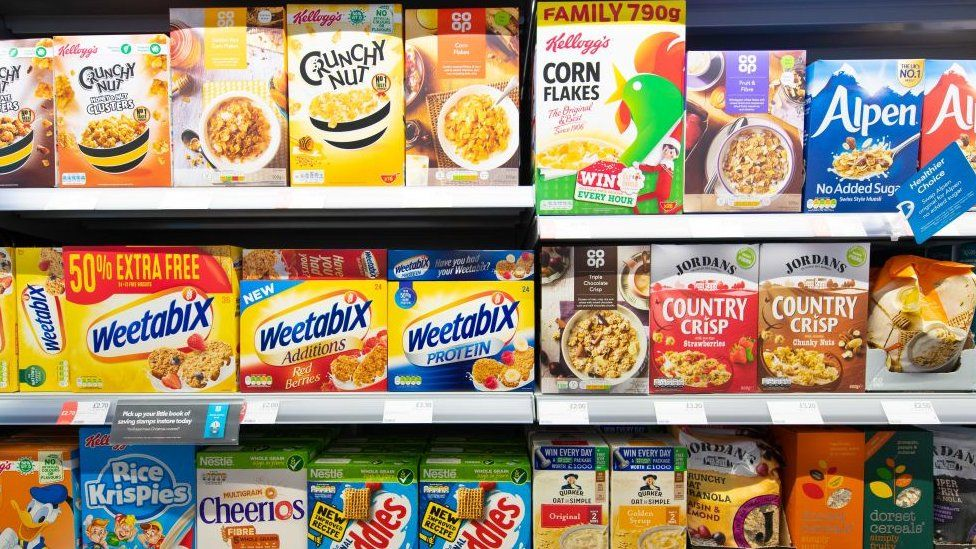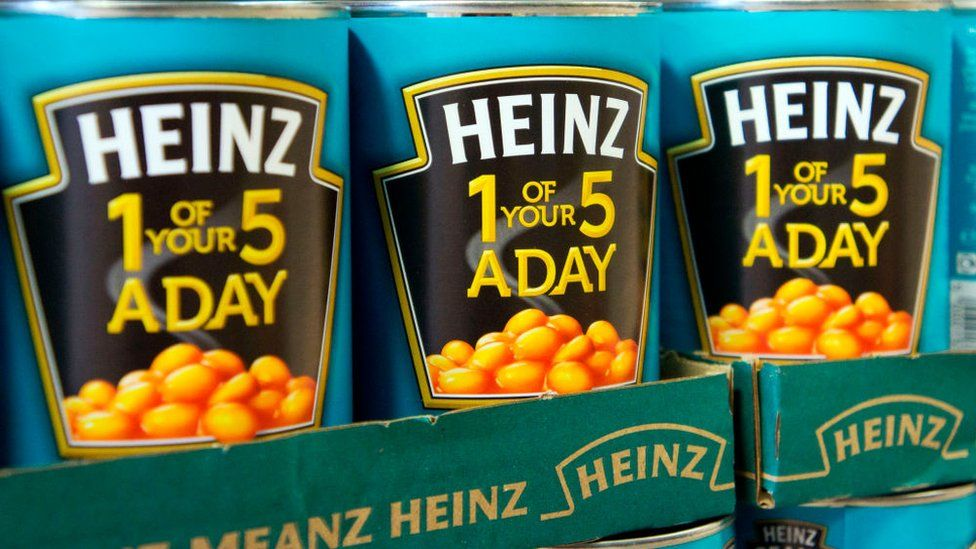Kellogg's will not be allowed to promote sugary cereals in supermarket special offers, a court has ruled. In-store promotions on food and drink high in fat, salt or sugar will be restricted under new rules for England. Food giant Kellogg's had taken the government to court arguing the rules did not take into account the nutritional value of added milk. But the Royal Courts of Justice ruled in favour of the government. Kellogg's said it was "disappointed". The Department of Health and Social Care said it strongly welcomed the judgement as location promotion restrictions were expected to deliver more than £57bn of health benefits. From October, foods deemed high in fat, sugar or salt will be banned from prime spots such as checkouts, store entrances, aisle ends and their online equivalents. The company said independent market data showed cereals were eaten with milk or yoghurt in 92% of cases. But Judge Mr Justice Linden said Kellogg's cereals "do not come with instructions for preparation which say that they should be consumed with milk". Kellogg's Mr Silcock said the firm would not appeal against the judgement, but urged the government to rethink the new rules.
Monday 11 July 2022
Heinz & Tesco Agree
Tesco and Heinz have reached an agreement which will see some of the UK's best known products back on the supermarket chain's shelves in the coming days. Heinz beans and tomato ketchup were among the products that had disappeared from Tesco's shelves in a pricing row. Tesco declined to say whether those products would be going up in price due to the new agreement. Kraft Heinz said at the time it was becoming more expensive to make its products. Baked beans, ketchup and tomato soup were among the staples that went missing from shelves in some Tesco stores after Heinz stopped supplying the retailer. Last month, the Daily Telegraph reported that Heinz had wanted to charge 30% more to supply some products.As well as Heinz, Tesco also fell out with Mars in a row over prices. This row - which is as yet unresolved - has led to the US food giant halting supplies of Whiskas pet food to the supermarket chain.
Sainsburys Customers Switching Down
Sainsbury's customers are switching to own-brand products and cutting back on non-essential spending as prices rise more quickly, the supermarket's boss has said. Simon Roberts added that pressure on household budgets is set to increase over the rest of the year. Households have been struggling with the cost of living as energy, food and fuel bills soar. Some customers are "switching into economy own-label" when food shopping, while Sainsbury's is seeing customers "pulling back" some spending on general merchandise, Mr Roberts said, with larger "big ticket" items "more challenged". Last month, a BBC-commissioned survey suggested that people were cutting back on food, fuel and clothes as prices rise. Despite its latest comments, Sainsbury's said it still expected full year underlying profit before tax to be in line its previous estimate of between £630m and £690m.
Friday 1 July 2022
McVitie's Wholesense
McVitie’s is taking a fresh crack at a healthier digestive biscuit. Its new non-HFSS digestive biscuit – Wholesense Digestives – is claimed to offer 30% less sugar and 50% more fibre than its standard counterpart, while retaining “the distinctive, salty-sweet flavour”. The biscuits hit shelves this week in 300g packs designed with “distinctive, bold on-pack flashes” highlighting their “added benefits” (rsp: £1.59). The NPD would make it “even easier for shoppers to tuck into their biscuit tin favourites, whether they are looking for an indulgent treat or something a little lighter”, said David Titman, marketing director at McVitie’s owner Pladis. The launch is part of a massive push from Pladis to reduce sugar and boost health credentials across its range, which included the rollout of a non-HFSS Rich Tea biscuit earlier this year. Prior to that, in 2020, it reformulated a spate of its brands to be healthier, including Original Digestives, Chocolate Digestives, Hobnobs, Caramel Digestives and Ginger Nuts. At the time, the supplier said it had tested the recipe changes with “hundreds of consumers” including “a group of McVitie’s superfans” to ensure the biscuits tasted the same when dunked into a cup of tea.
Heinz Price Dispute
Heinz has stopped supplying Tesco with some of the UK's family favourite products in a dispute over pricing. Baked beans, ketchup and tomato soup are among the cupboard staples missing from shelves in some Tesco stores. Kraft Heinz, which owns the brand, said its production costs were rising but it was working with Tesco to resolve the situation quickly. But Tesco said: "We will not pass on unjustifiable price increases to our customers." "We're sorry that this means some products aren't available right now," a Tesco spokesperson said. "We hope to have this issue resolved soon." In recent months food manufacturers have reported rising costs, including for energy and commodities, with some warning they would need to raise the prices they charge to retailers. However supermarkets such as Tesco are striving to keep prices low for customers facing a cost-of-living squeeze and shopping more carefully. Manufacturers were absorbing unprecedented food price rises from retailers for the fourth or fifth time in the last 18 months, he said.
Pret A Manger in India
A firm owned by Asia's richest person has struck a deal to open outlets of the British coffee and sandwich chain Pret A Manger across India. A unit of multi-billionaire Mukesh Ambani's Reliance Industries will run the chain under a franchise agreement. It marks the first venture by Reliance Brands, which also owns India's biggest retail chain, into the country's growing food and drinks industry. The first outlet is expected to open early next year in Mumbai. Pret A Manger, which means "ready to eat" in French, was founded in London in 1983, with the first shop opening the following year. The brand currently has 550 outlets around the world, across nine markets including the UK, US, Europe, and Asia. Last year, Reliance Industries announced a franchise agreement with the US-based convenience store chain 7-Eleven. The deal helped to cement the company's position as India's largest bricks and mortar retailer.
Subscribe to:
Posts (Atom)





